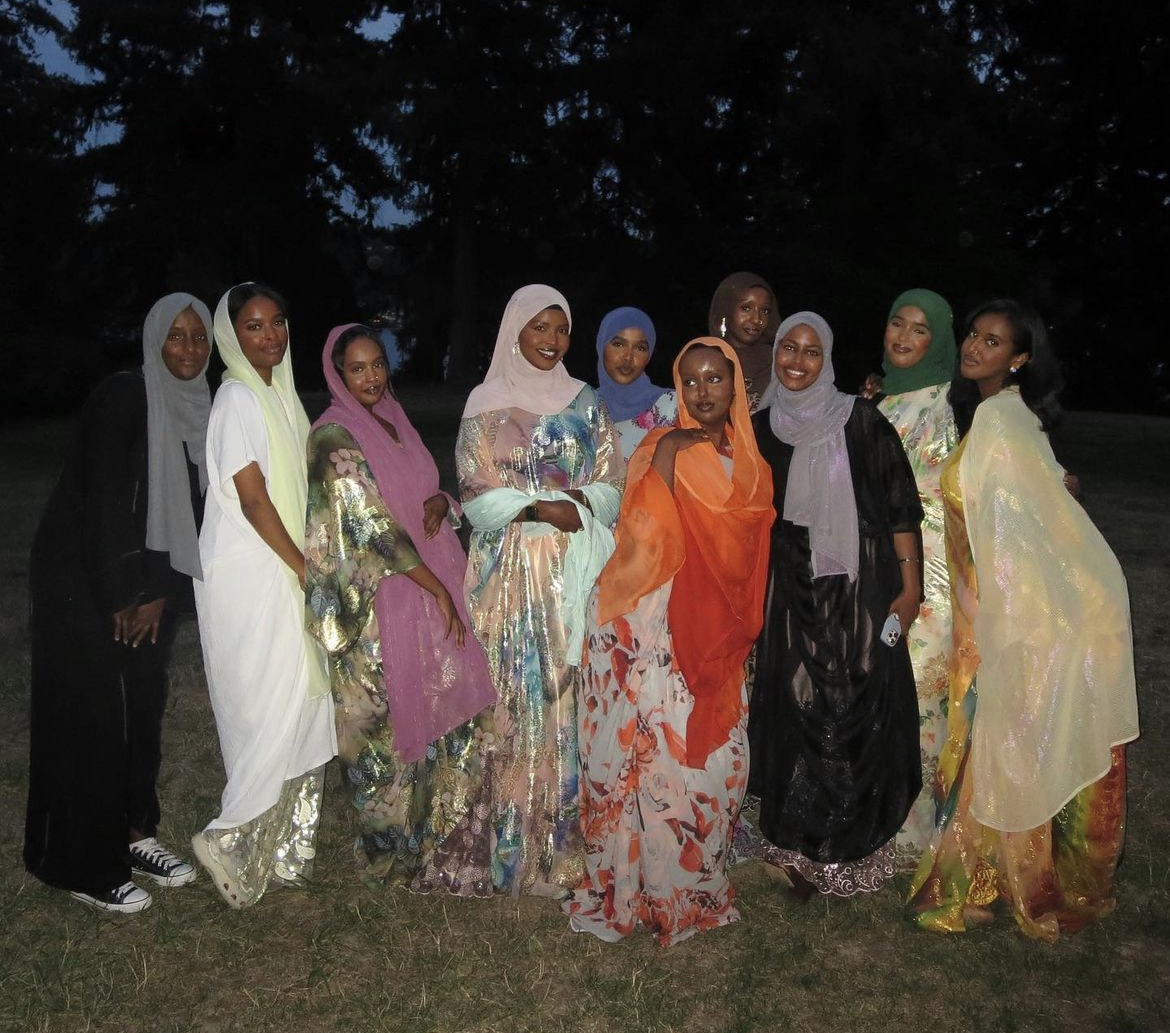Somali Girls Club is Just Getting Started
Some people seek out community and others create their own. Somali Girls Club (SGC), started by Warda Mohamed and Nawal Abduallahi aims to connect Somali girls in the greater Seattle area through community events and socials.
During the height of COVID-19 back in 2020, Warda found herself longing for community. She stumbled on a tweet featuring an all-girls Somali gathering in the United Kingdom, sparking the creation of the SGC Instagram page alongside Nawal. With only 10 posts and 269 followers, SGC, while in its early stages, is coming up to become an all-inclusive environment for Somali girls in Seattle.
The page features Pinterest-inspired flicks and Canva infographics detailing logistics for future events. Their first post from July 31, 2023, declares “Welcome all to SGC!! We are a Seattle based duo wanting to reach out and connect with sisters in our community for monthly meet ups. Our first link up will be announced soon.“
But what led to this point? How are the events planned, what makes SGC unique, and how can those feeling that same lack of community someday create their version of a Somali Girls Club?
From the height of COVID-19 to their first Instagram post, Warda, one-half of SGC, recounts the Somali Girls Club from its inspiration to its inception:
“We both wanted deeper friendships, we both wanted more female friendships, more women to be in community [with] that are around our age and I think we found that in Somali Girls Club.”
The two met through mutual friends and the idea of SGC had been sitting on Warda’s mind before officially sharing it with Nawal. Warda describes the idea as a slow burn. It originated from her isolation during COVID-19 but was later reignited by a tweet she saw on her feed as COVID restrictions began to lift.
“It was a picture of a bunch of Somali women smiling and they were sitting down for dinner. The tweet basically was saying that they meet once a month, and they just like hanging out and how much fun it is,” Warda said. “Lots of people under the tweet were like, ‘Oh, my God, that’s such a great idea. I love that’ and I was one of those people.”
Three years later SGC was born.
But this 3-year period consisted of what Warda described as “life getting in the way.” While the tweet embodied something Warda desired, she didn’t immediately act upon this discovery because she never felt like it was the right time to start.
She also had no interest in taking on this endeavor alone. But once she was ready to commit and “get this moving”, Nawal, who was already a close friend, was the person Warda “thought of and went to first.”
It’s clear the two are a great pairing. It takes a lot of effort to plan an event, especially without a big team, but they have mastered a routine for how they go about organizing their own.
“We talk logistics. We think of when, where, how, transportation, and then we move on to the fun stuff, which is decorating and poster making, and figuring out a theme…And then we post on our Instagram and sometimes we have RSVPs and we have limited seats and other times anyone and everyone is welcome.”
Their first event, which took place at a public movie screening at the Seattle Center, was open to everyone and didn’t take much to plan out.
“We really lucked out in the fact that we found a community-based event in the city that was already being hosted and coordinated. So we really didn’t have to worry about that [planning] aspect.”
Warda says all that was needed was for attendees to just “show up with your snacks and a blanket” and she felt it turned out great. Despite the success of the event, Warda and Nawal initially expressed self-doubts and nervousness about the day to come.
“We very much like, ‘Oh, why did we do this?’ You know? Because especially when you get there, and you’re like, ‘Oh, okay, so no one might come to this’…we might experience rejection in its most pure form.”
It turns out that that was further from the truth. While the get-together came with unprecedented challenges like not being able to find all of the girls because it was dark, they were still able to make the best of it and meet new people.
However, when it came time to plan their second event, the stakes were higher.
“Essentially, we had to start from scratch and we had to communicate and we had to be efficient and we had to really work as a team.”
This is because they were hosting a potluck-style “Dirac Social” exclusive to SGC. They had the responsibility of coordinating everything from start to finish. A dirac is a piece of clothing worn by Somali women at celebrations.
Planning events like the Dirac Social can get expensive quickly. Warda, who while working on SGC is also a student, explained that they had to get creative if they wanted to host something cost-efficient.
“…everything was on us,” said Warda. “We were decorating, we were thrifting, and going on the less expensive side for things.”
If you take a look at SGC’s Instagram, you would be right to assume that this second event was also a success. You also wouldn’t have been able to tell that Warda’s biggest worry was whether or not people would have even shown up.
“…I think it was just like not knowing what to anticipate,” Warda explained. “What’s gonna happen? Who’s coming? Who’s not coming? Stuff like that, just sitting in waiting for people to slowly come in one by one was anxiety-inducing.”
Planning an event is one thing but getting the word out also comes with its difficulties. Even though Warda was worried about who would show up, it’s clear their reliance on word of mouth and social media for promotion is working.
“Last month, there was a girl at our event whose husband saw our page and sent her our page and was like, ‘You should go.’ And so I thought that was really sweet,” Warda said.
Part of what makes SGC unique is its ability to provide members with a space to be themselves, unapologetically.
“My favorite memory so far has been young Somali mothers coming [to the events] and you can just see parts of their girlhood shining through.”
Warda revealed that most events for girls/women in the vicinity are typically associated with the Masjid, a religious space for people who practice Islam, which has its expectations.
“…there is a certain expectation that comes when you are at the Masjid, right? When you are within the community of the Masjid and that’s understandable…we carry ourselves a certain way,” Warda said.
While Warda understands and appreciates the Masjid as a space for focusing on religion, she simply wanted to fill a gap within her community. She wanted to provide a space where Somali Girls could be themselves.
“Anyone who might be struggling with their Deen, anyone who might not feel accepted in the Masjid or might not feel accepted by the community can come and just hang out and not have to worry,” Warda said.
So what’s next for SGC?
 Courtesy of Jehan
Courtesy of Jehan Warda reflected on the future of the Somali Girls Club when I asked her to envision what it’ll look like in 4 or 5 years. She grapples with whether she’ll continue this endeavor or pass it down to someone else.
“I hope that we have consistent meetups, I hope that we have more people helping us, and I hope it’s still around”, said Warda. “I hope that if we grow out of it, we’re able to give it to different people and they can keep doing this.”
As of right now, Warda explained that they are deciding on whether to make their events bi-monthly to ease planning and are thinking about gearing events toward certain age groups. She also hopes that it grows at a steady pace.
The community Warda and Nawal have managed to build is admirable. They were able to create a space where Somali girlhood could be celebrated. For those who hope to create a community of their own, Warda has some words of advice:
“I think just doing it, even if it’s just you, even if it’s just you and a friend, truly start it, make that page. We all have to start somewhere and don’t underestimate the way your community will show up for you.”
Jehan was a fellow in the 2023 Story Gathering Sandbox, a program that gave four young writers the opportunity to publish an article for our news outlet, Voices.


Our Northwest ethnic cultural communities have stories to tell and we need your support to amplify them! Donate $5 or $10 to help us continue raising the visibility of Northwest cultural community organizations and members. Follow us on social media or sign up for our mailing list to stay up to date on the latest in the Northwest.
